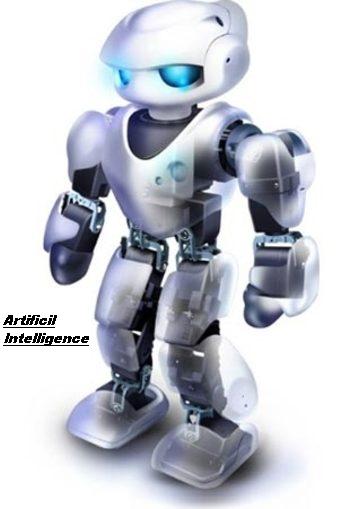GENERATIONS OF COMPUTER
The computer has evolved from a large-sized simple calculating machine to a smaller but much more powerful machine. The evolution of computer to the current state is defined in terms of the generations of computer. Each generation of computer is designed based on a new technological development, resulting in better, cheaper and smaller computers that are more powerful, faster and efficient than their predecessors. Currently, there are five generations of computer. In the following subsections, we will discuss the generations of computer in terms of—
-
The technology used by them (hardware and software).
-
Computing characteristics (speed, i.e., number of instructions executed per second).
-
Physical appearance.
-
Their applications.
First Generation (1940 to 1956): Using Vacuum Tubes
-
Hardware Technology: The first generation of computers used vacuum tubes for circuitry and magnetic drums for memory. The input to the computer was through punched cards, Magnetic tape and paper tapes. The output was displayed as printouts.
-
Software Technology: The instructions were written in machine language. Machine language uses 0s and 1s for coding of the instructions. The first generation computers could solve one problem at a time. In this generation, mainly batch processing operating systems were used.
-
Computing Characteristics: The computation time was in milliseconds.
-
Physical Appearance: These computers were enormous in size and required a large room for installation.
-
Application: They were used for scientific applications as they were the fastest computing device of their time.
-
Examples: UNIVERSALl Automatic Computer (UNIVAC), Electronic Numerical Integrator and Calculator (ENIAC), and Electronic Discrete Variable Automatic Computer (EDVAC). The UNIVAC was the first commercial computer delivered to a business client, the U.S. Census Bureau in 1951
Drawbacks: The first generation computers used a large number of vacuum tubes and thus generated a lot of heat. They consumed a great deal of electricity and were expensive to operate. The machines were prone to frequent malfunctioning and required constant maintenance. Since first generation computers used machine language, they were difficult to program.
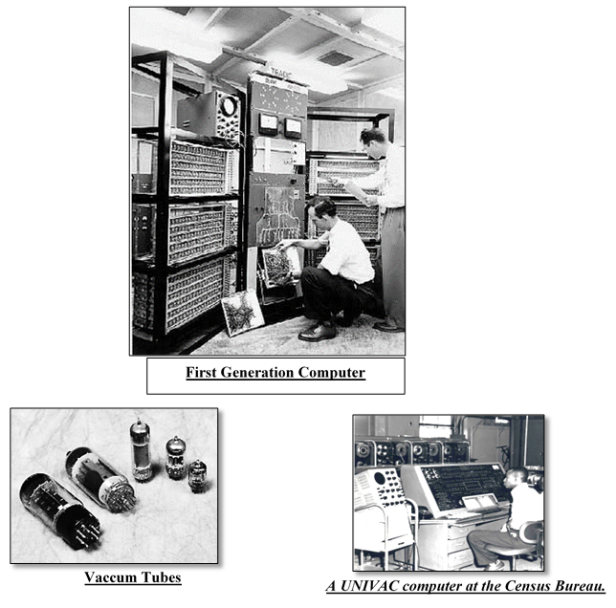
Second Generation (1956 to 1963): Using Transistors
-
Hardware Technology: Transistors replaced the vacuum tubes of the first generation of computers. The transistor was invented in 1947 but did not see widespread use in computers until the late 1950s. The transistor was far superior to the vacuum tube. Transistors allowed computers to become smaller, faster, cheaper, energy efficient and reliable. The second generation computers used magnetic core technology for primary memory. They used magnetic tapes and magnetic disks for secondary storage. The input was still through punched cards and the output using printouts. They used the concept of a stored program, where instructions were stored in the memory of computer.
-
Software Technology: The instructions were written using the assembly language. Assembly language uses mnemonics like ADD for addition and SUB for subtraction for coding of the instructions. It is easier to write instructions in assembly language, as compared to writing instructions in machine language. High-level programming languages, such as early versions of COBOL and FORTRAN were also used. There were Batch processing and Multiprogramming Operating system used. These were also the first computers that stored their instructions in their memory, which moved from a magnetic drum to magnetic core technology.
-
Computing Characteristics: The computation time was in microseconds.
-
Physical Appearance: Transistors are smaller in size compared to vacuum tubes, thus, the size of the computer was also reduced and it becomes faster, cheaper, more energy-efficient and more reliable than their first-generation predecessors. The first computers of this generation were developed for the atomic energy industry.
-
Application: The cost of commercial production of these computers was very high, though less than the first generation computers. The transistors had to be assembled manually in second generation computers.
-
Examples: PDP-8, IBM 1401 and CDC 1604.
-
Comparisons: Second generation computers generated a lot of heat but much less than the first generation computers. They required less maintenance than the first generation computers.
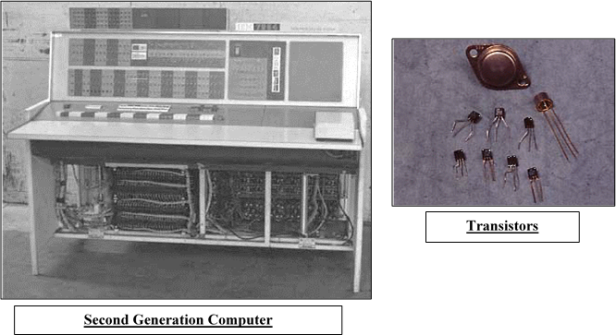
Third Generation (1964 to 1971): Using Integrated Circuits
-
Hardware Technology: The third generation computers used the Integrated Circuit (IC) chips. In an IC chip, multiple transistors are placed on a silicon chip. Silicon is a type of semiconductor. The IC was invented by Jack Kilby of Texas Instruments and Robert Noyce of Fairchild Semiconductor. The use of IC chip increased the speed and the efficiency of computer, manifold. The keyboard and monitor were used to interact with the third generation computer, instead of the punched card and printouts.
-
Software Technology: The keyboard and the monitor were interfaced through the operating system. Operating system allowed different applications to run at the same time with a central program that monitored the memory. High-level languages were used extensively for programming, instead of machine language and assembly language.
-
Computing Characteristics: The computation time was in nanoseconds.
-
Physical Appearance: The size of these computers was quite small compared to the second generation computers.
-
Application: Computers became accessible to mass audience. Computers were produced commercially, and were smaller and cheaper than their predecessors.
-
Examples: IBM 370, PDP 11.
-
Comparisons: The third generation computers used less power and generated less heat than the second generation computers. The cost of the computer reduced significantly, as individual components of the computer were not required to be assembled manually. The maintenance cost of the computers was also less compared to their predecessors.
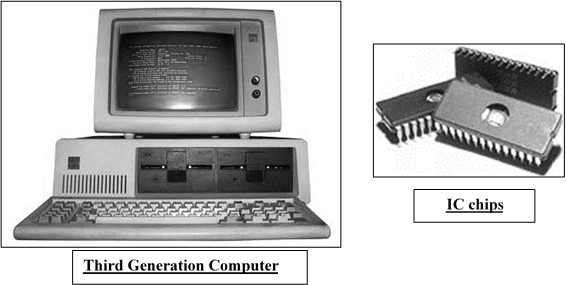
Fourth Generation (1971 to present): Using Microprocessors
-
Hardware Technology: They use the Large Scale Integration (LSI) and the Very Large Scale Integration (VLSI) technology. Thousands of transistors are integrated on a small silicon chip using LSI technology. VLSI allows hundreds of thousands of components to be integrated in a small chip. This era is marked by the development of microprocessor. Microprocessor is a chip containing millions of transistors and components, and, designed using LSI and VLSI technology. Microprocessors also moved out of the realm of desktop computers. This generation of computers gave rise to Personal Computer (PC). Semiconductor memory replaced the earlier magnetic core memory, resulting in fast random access to memory. Secondary storage device like magnetic disks became smaller in physical size and larger in capacity. The linking of computers is another key development of this era. The computers were linked to form networks that led to the emergence of the Internet. This generation also saw the development of GUIs like mouse, and handheld devices.
-
Software Technology: Several new operating systems like the MS-DOS and MS-Windows developed during this time. This generation of computers supported Graphical User Interface (GUI). GUI is a user-friendly interface that allows user to interact with the computer via menus and icons. High-level programming languages are used for the writing of programs.
-
Computing Characteristics: The computation time is in picoseconds.
-
Physical Appearance: They are smaller than the computers of the previous generation. Some can even fit into the palm of the hand.
-
Application: They became widely available for commercial purposes. Personal computers became available to the home user.
-
Examples: The Intel 4004 chip was the first microprocessor. The components of the computer like Central Processing Unit (CPU) and memory were located on a single chip. In 1981, IBM introduced the first computer for home use. In 1984, Apple introduced the Macintosh. CRAY-1 (Super Computer), CRAY-X-MP (Super Computer) etc.
-
Comparisons: The microprocessor has resulted in the fourth generation computers being smaller and cheaper than their predecessors. The fourth generation computers are also portable and more reliable. They generate much lesser heat and require less maintenance compared to their predecessors. GUI and pointing devices facilitate easy use and learning on the computer. Networking has resulted in resource sharing and communication among different computers.
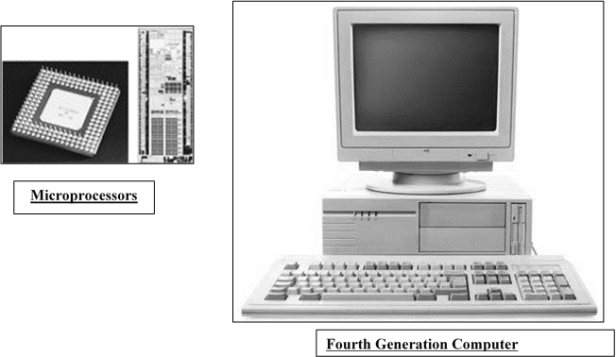
Fifth Generation (1980-till date and Next): Using Artificial Intelligence
-
Hardware Technology: The goal of fifth generation computing is to develop computers that are capable of learning and self-organization. The fifth generation computers use Super Large Scale Integrated (SLSI) chips that are able to store millions of components on a single chip. These computers have large memory requirements.
-
Software Technology: This generation of computers uses parallel processing that allows several instructions to be executed in parallel, instead of serial execution. Parallel processing results in faster processing speed. The Intel dual-core microprocessor uses parallel processing. The fifth generation computers are based on Artificial Intelligence (AI). They try to simulate the human way of thinking and reasoning. All the higher level languages like C and C++, Java, .Net, etc., are used in this generation. Artificial Intelligence includes areas like Expert System (ES), Natural Language Processing (NLP), speech recognition, voice recognition, robotics, etc.
-
Examples: Robots.
